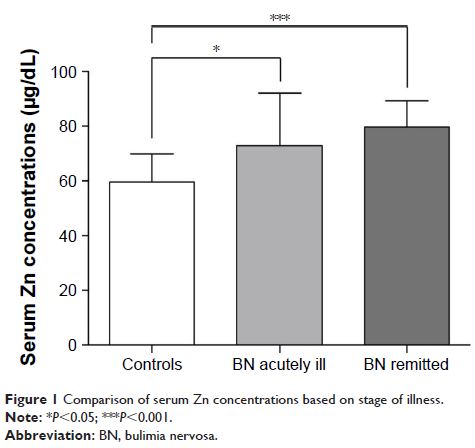108985
论文已发表
注册即可获取德孚的最新动态
IF 收录期刊
- 3.4 Breast Cancer (Dove Med Press)
- 3.2 Clin Epidemiol
- 2.6 Cancer Manag Res
- 2.9 Infect Drug Resist
- 3.7 Clin Interv Aging
- 5.1 Drug Des Dev Ther
- 3.1 Int J Chronic Obstr
- 6.6 Int J Nanomed
- 2.6 Int J Women's Health
- 2.9 Neuropsych Dis Treat
- 2.8 OncoTargets Ther
- 2.0 Patient Prefer Adher
- 2.2 Ther Clin Risk Manag
- 2.5 J Pain Res
- 3.0 Diabet Metab Synd Ob
- 3.2 Psychol Res Behav Ma
- 3.4 Nat Sci Sleep
- 1.8 Pharmgenomics Pers Med
- 2.0 Risk Manag Healthc Policy
- 4.1 J Inflamm Res
- 2.0 Int J Gen Med
- 3.4 J Hepatocell Carcinoma
- 3.0 J Asthma Allergy
- 2.2 Clin Cosmet Investig Dermatol
- 2.4 J Multidiscip Healthc

Differences in serum zinc levels in acutely ill and remitted adolescents and young adults with bulimia nervosa in comparison with healthy controls – a cross-sectional pilot study
Authors Zepf FD, Rao P, Runions K, Stewart RM, Moore JK, Wong JWY, Linden M, Sungurtekin I, Glass F, Gut L, Peetz D, Hintereder G, Schaab M, Poustka F, Wöckel L
Received 20 March 2017
Accepted for publication 22 June 2017
Published 17 October 2017 Volume 2017:13 Pages 2621—2630
DOI https://doi.org/10.2147/NDT.S137549
Checked for plagiarism Yes
Review by Single-blind
Peer reviewers approved by Prof. Dr. Roumen Kirov
Peer reviewer comments 2
Editor who approved publication: Professor Wai Kwong Tang
Background: Research has implicated that changes in zinc (Zn) metabolism may
be associated with the biological underpinnings of eating disorders, in
particular anorexia nervosa. However, to date research on the role of Zn in
patients with bulimia nervosa (BN) is scarce.
Objective: We aimed to explore serum Zn concentrations in
young patients with BN, with a focus on the stage of the disorder, comparing
acutely ill and recovered patients with BN with healthy controls.
Methods: Serum Zn concentrations were obtained from healthy
controls and from acutely ill and remitted young patients with BN. Mean
duration of remission was 4.0±3.5 years.
Results: Remitted patients showed elevated serum Zn
concentrations when compared to controls (Cohen’s d=2.022), but concentrations
were still in the normal range. Acutely ill patients also had higher serum Zn
levels when compared to controls (all values still being within the reference
range, Cohen’s d=0.882). There was no difference between acutely ill and
remitted patients with BN in serum Zn concentrations. Of note, remitted
patients had a significantly higher body weight when compared to the other two
groups. Overall, there were no significant differences in dietary preferences
with regard to Zn containing foods between the groups.
Conclusion: The present study provides preliminary evidence that
the underlying factors for changes in Zn serum concentrations in young patients
with BN do not vary with regard to the stage of illness (acute versus remitted
BN). Further prospective research is needed in order to disentangle the
possible interplay between serum Zn status and bulimic eating behaviors.
Keywords: bulimia
nervosa, zinc, serum concentrations, remission, eating disorders
